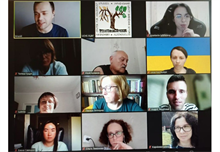"How to talk about the Holocaust after February 24?" working group. First meetings.
 We held the first meetings of “How to talk about the Holocaust after February 24?” working group. The participants began preparation of the recommendations for colleagues concerning teaching the Holocaust in the context of ongoing war. The work takes place in groups, joint debates, discussions, and notes on an interactive board. This work is crucial for everybody who has taken part in first meeting, both for their own professional and personal development and sometimes emotional relief, as well as to create a useful advisor for colleagues.
We held the first meetings of “How to talk about the Holocaust after February 24?” working group. The participants began preparation of the recommendations for colleagues concerning teaching the Holocaust in the context of ongoing war. The work takes place in groups, joint debates, discussions, and notes on an interactive board. This work is crucial for everybody who has taken part in first meeting, both for their own professional and personal development and sometimes emotional relief, as well as to create a useful advisor for colleagues.
Interesting speakers and intense, productive meetings are ahead for the entire summer.
And here are the opinions of the participants, why it is important for them to take part in the working group:
 “I want to get professional advice and effective tools on how to talk about the Holocaust tragedy against the background of the manifestations of Russian genocide against the Ukrainian people”.
“I want to get professional advice and effective tools on how to talk about the Holocaust tragedy against the background of the manifestations of Russian genocide against the Ukrainian people”.
 “It is very important for me to share our experience in a friendly expert environment and try to help others with concrete advice"
“It is very important for me to share our experience in a friendly expert environment and try to help others with concrete advice"
 “Thanks to you, I can get new knowledge, which is always accessible and easy. And I can also get an answer to the question: "How to talk about the war after 24.02.2022”
“Thanks to you, I can get new knowledge, which is always accessible and easy. And I can also get an answer to the question: "How to talk about the war after 24.02.2022”
 “It is important for me to answer the question: “How to talk about the war and draw parallels (if possible) with the Holocaust and the war in Ukraine?”
“It is important for me to answer the question: “How to talk about the war and draw parallels (if possible) with the Holocaust and the war in Ukraine?”
 “For me, it is important to find an answer to the question: “How to work with children who have traumatic experiences that arose in the conditions of war?” and how to teach the tragic pages of history without traumatizing them again”
“For me, it is important to find an answer to the question: “How to work with children who have traumatic experiences that arose in the conditions of war?” and how to teach the tragic pages of history without traumatizing them again”
 “As a scholar-historian, I am interested in everything related to the Second World War and its parallels today. As a teacher I need tools and means with the help of which I can convey this knowledge to children”
“As a scholar-historian, I am interested in everything related to the Second World War and its parallels today. As a teacher I need tools and means with the help of which I can convey this knowledge to children”
 “The events of the Russian-Ukrainian war will undoubtedly affect the teaching of history, in particular, the history of the Second World War and the Holocaust. I want to help myself and my fellow teachers navigate new realities, develop effective mechanisms and work tools"
“The events of the Russian-Ukrainian war will undoubtedly affect the teaching of history, in particular, the history of the Second World War and the Holocaust. I want to help myself and my fellow teachers navigate new realities, develop effective mechanisms and work tools"
Announcements
MoreLatest News
-
THE HOLOCAUST AS A STARTING POINT Ukrainian teachers training in France
From February 9 to 12, Paris hosted the scholarly and methodological seminar Holocaust as a Starting Point, organized by the Shoah Memorial in cooperation with the Ukrainian Center for Holocaust Studies. The program featured lectures, workshops, museum practice, and excursions.
[More] -
(No) Children’s Stories Exhibition in Odesa. Completion of Work
The exhibition (No)Children’s Stories has come to an end at the “Memory” Cinema Museum of Odesa Lyceum No. 56 of the Odesa City Council. We sincerely thank the staff of the Lyceum for the high level of organization and execution of the exhibition.
[More] -
IN MEMORIAM Semen Gluzman (10.09.1946 – 16.02.2026)
On February 16, 2026, at the age of 80, Ukraine lost a great public figure, psychiatrist, and dissident - Semen Gluzman.
[More] -
Holocaust Memory: Academic and Educational Challenges in Wartime
On February 3, 2026, Anatolii Podolskyi, Director of the Ukrainian Center for Holocaust Studies, delivered an online lecture for students of the Faculty of History at Oles Honchar Dnipro National University on the topic Holocaust Memory, Academic and Educational Aspects: Challenges in Times of War.
[More] -
Bulletin «Lessons of the Holocaust», № 4 (84), 2025
Dear colleagues! The fresh issue of information-pedagogical bulletin of UCHS «Lessons of the Holocaust», № 4 (84), October-December, 2025 has been published.
[More]




